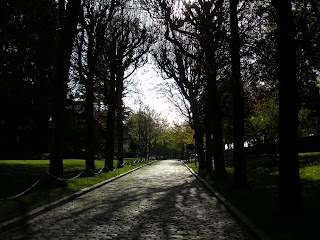It was a perfectly lovely morning to be walking through the perfectly lovely Pere-Lachaise cemetery, with its cobbled, tree-lined paths and the warm sun filtering through the thinning leaves.


There is a map near the entrance which directs you to the grave sites of the (in)famous.
Who the hell is the clown?
We were going along, quietly mocking the living
and also the dead, as we like to do (you may find that cold or lacking in empathy but I can assure you I am only returning the favor—the dead are surely mocking the living and if they are not then they have no business being dead. If death does not strip away every vestige of our human absurdities then what is the point?)
Besides which if the dead did not wish to be mocked then they should not give us so much to mock them about. After all, who the hell needs to buried in a castle? What does that say about you and your life? That you always wanted to live in a castle? That you slaved away your life for enough money to afford a castle in death?
Nothing says that you were a rich and powerful man more than having a bare breasted woman holding a giant condom for you:
or that you were so beloved in life that you need not one but two permanent mourners:
And then there was this:
which deserves a close-up. Were you a vampire? Did your family hate you? Why would anyone put such a thing on a tombstone?
We visited with Oscar Wilde, he of one of my favorite quotes, ‘we are all in the gutter, some of us are looking at the stars’
Je t'aime Oscar, someone scribbled on his tombstone, while hundreds of others left lipstick kisses.

Then we visited with Jim Morrison, also originator of one of my favorite quotes, ‘I woke up this morning and I got myself a beer, the future’s uncertain and the end is always near.’
And someone thoughtfully left him an empty beer can as if to express their own appreciation of that sentiment.
His grave has been fenced in since a couple were discovered having sex on it.
The Greek inscription on the bottom enigmatically has two translations:
'one who fights his own demons'
'true to his own spirit'
Whichever was intended, certainly both applied.
And then as we headed for the exit, we came across this:
and this:
and this:

and this:


And I came as close to crying in public as I ever have.
Many people are casually misanthropic, such as anarchists and hipsters who hate just because they enjoy the act of hating. They define themselves by their hatred. I consider them dilettantes. My misanthropy has been carefully cultivated, well thought out, rationally reasoned and reality based. Grown from a single seed self-planted in my early teens my misanthropy grows straight and true with prudent pruning throughout the years to keep stray growth at bay. I have always thought, from my early teen years, how absurd we are as humans. An animal may kill another for food or for territory or for the right to mate or the right to lead, but only humans will kill another human because of an idea.
What, exactly, is an idea? Let’s take it to the quantum level. Isn’t an idea merely an impulse in the brain? A firing of synapse and dendrite, a micro-jolt of electricity. An idea, any idea, no matter how powerful, has no more substance than air, than the fleeting spark off a flint. An idea is a puff of smoke, the evening breeze, the vapor rising from the ground after a summer rain. An idea, good, bad or indifferent, contains less electricity than the static cling coming off your socks fresh from the dryer. You can’t hold an idea in your hand, put it in the bank, barter it away, have sex with it or eat it, yet men will kill one another for a single one of them; not so they can possess it but rather so they can destroy it.
I’ve always believed that this distinction alone is what marks our species as hopelessly irrelevant and doomed to annihilation by our own hand. It is the fount of my misanthropy, the Schaden in my freude. In my heart I know that as a species we are fucking idiots and every bit deserving of whatever self-induced extinction we settle upon be it melting polar ice caps, peak phosphorus, nuclear conflagration, man-made virus, or just killing one another out of simple fear of each other and a perverse love of guns.
I know that’s cynical and not a little bitter, but it’s a conclusion I came to long ago based entirely on all of recorded history and observed human behavior; no one could argue my conclusion unconsidered or undeserved.
But as a person who aspires to enlightenment, I try to hold my cynicism in check, try to see the good as well as the apocalyptic, but faced with what we saw that day in Pere-Lachaise, it is hard to see anything but the total idiocy of our species.
That afternoon, in the Latin Quarter, we stumbled upon the Pantheon, down the block from the Sorbonne. Not knowing what it was, but intrigued by it's scale and architecture, in we went. 
Inside we saw a recreation of Foucault’s pendulum which, as it swings back and forth, appears to shift its plane 11 inches every hour, but in fact it is the earth rotating beneath it that is shifting.
and we saw the tombs of a lot of dead guys. Voltaire, Rousseau, Victor Hugo, Dumas, Marie Curie and Louis Pasteur, Emile Zola, Andre Malraux.
And then Mary pointed out this tomb marker in a dim corner, tucked out of the way as if an afterthought:
the inscription reads:
a la memoire des martyrs de la revolution
tombes en 1830 et 1848
pour la defense de leurs ideaux
in memory of the martyrs of the revolution
tombs in 1830 and 1848
for the defense of their ideals
And I realized instantly that this is the flip side of my well-reasoned dismissal of humankind. We may be willing to kill another because of an idea, but we are also willing to die for one too. Perhaps our damnation also has our salvation built into it, yin and yang, life held in balance.
It’s a more comforting thought to have than my blanket condemnation of the species but I am still left with, in my heart-of-hearts, this Taoist sentiment which has always guided my path and informs my belief about most human endeavors:







